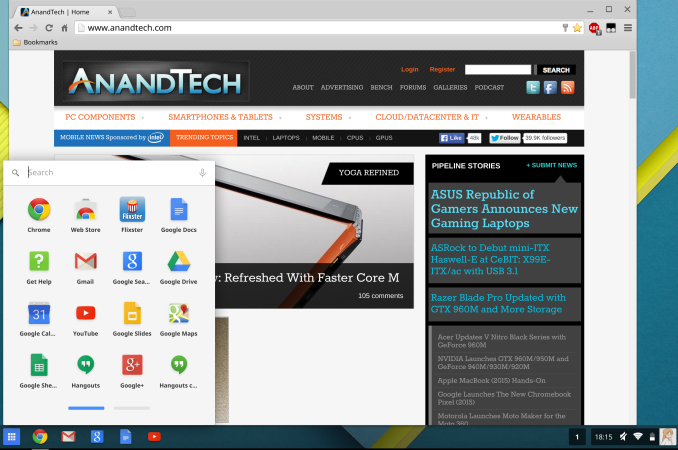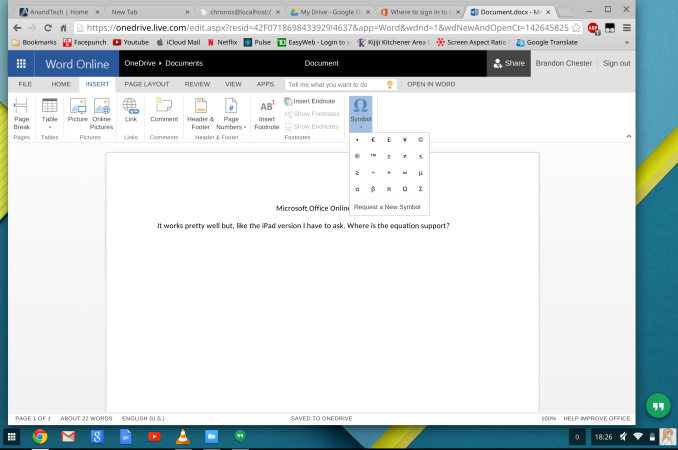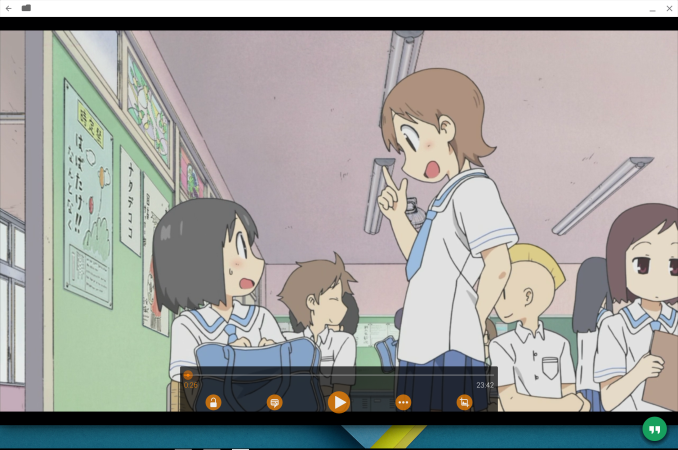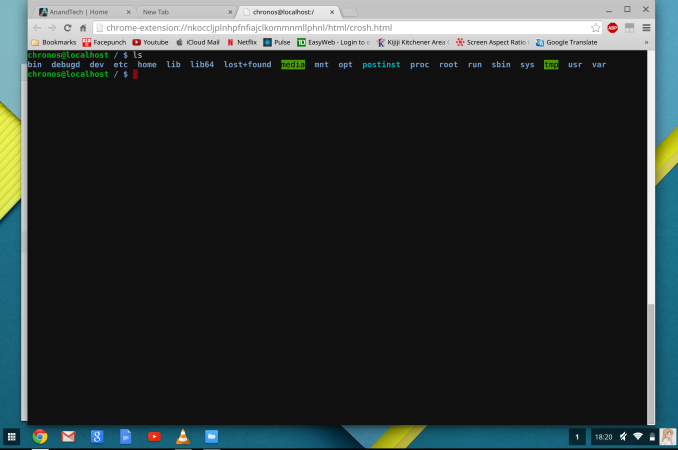The Chromebook Pixel (2015) Review
by Brandon Chester on March 16, 2015 8:00 AM EST- Posted in
- Laptops
- Chrome OS
- Chromebook
- Chromebook Pixel
Software
To tell the truth, I hadn't had much experience with Chrome OS before using the Chromebook Pixel. Years ago I installed Chromium OS to see what it was like, but I quickly wrote it off as far too limited to perform the tasks that I do on a daily basis. Since then, web applications have improved immensely, and Chrome OS itself has had new applications added and changes made to the interface to make it feel more like a typical operating system. But at its heart, it's still just Chrome and web apps, and so it was interesting to see what could be done within those bounds.
When you first get your Chromebook you'll be asked to log into your Google account. From that point, you're sent right to what could be called the home screen for Chrome OS. At the bottom you have a shortcut to Chrome, along with shortcuts to other Google products like Docs and Gmail which are actually just links to the website for each respective product. However, not all Chrome OS applications run within Chrome. There's a Calculator application which greatly resembles the Android Lollipop calculator, and a Files application to view your removable storage and downloads in addition to showing your files stored in Google Drive.
At this point you're basically ready to go. There aren't many settings to change or any applications to configure once you've signed in with your Google account. In fact, if you're already invested in Google's ecosystem you'll be able to start editing your Google Docs files and access your Google Drive immediately. I do use Google drive, but I use Microsoft Office instead of Google Docs, Sheets, and Slides for editing documents which could pose a problem. Luckily, Office has moved to the cloud and so users who don't edit their documents using Google's software aren't left out in the cold.
Unfortunately, many cloud counterparts to desktop software are missing important features. In the case of Office, you lose many formatting tools, including the ability to insert equations which is a tool I use frequently. Charts and text boxes are also removed in the cloud version of Word. I understand the need to simplify these applications when they're being run in a web browser, but it doesn't change the fact that many tools users expect to be there are missing.
How Google's office application handle files can also be somewhat problematic. I'm sure most people have been sent a file in one of Microsoft's Office formats at some point in their lives. Google claims somewhere around 90% feature compatibility with Microsoft Office files. On one hand, this is pretty impressive for software that runs in a web browser. But on the other hand, when you only have 90% feature compatibility, you're basically completely incompatible with every file that uses any feature from that last ten percent. Importing a PowerPoint file to Google Slides will cause objects like charts to just be completely erased, and I would hardly consider the use of charts in PowerPoint presentations to be uncommon.
For media playback, the default video and music applications are more than sufficient for most users. Google even has support for the Matroska container which is more than can be said for other operating systems. For playing back less common file types, or videos with subtitles, the built in players aren't quite up to the task. Luckily, the Android version of VLC is slated to come to Chrome OS in the near future via the App Runtime for Chrome. Google was able to provide me with a debug version to see how well it worked. It definitely needs some polish, but there's still quite some time between now and release, and I don't know how up to date the debug build I'm using is.
Overall, I think that Chrome OS still does a pretty good job of handling files that come from a Windows PC world. There's still work to be done though, and anybody who's considering the Pixel or any other Chromebook should understand what they're getting into.
For users who want to play around with the underlying Linux core of Chrome OS, there's a fully functional shell which is accessible via Chrome after putting the laptop into developer mode. This allows you to access more of the file system, and you can even install versions of Ubuntu or Debian using Crouton. Obviously I can't recommend doing so due to the potential security and stability risks, but the options are available for any users who are interested. The Chrome OS shell already has the ability to connect to another computer via SSH once developer mode is enabled, and it opens up a whole new world of possibilities for the Pixel.
I'm definitely more open to using Chrome OS than I was when the original Pixel launched. I know that many users would be able to do everything they currently do on Windows with a Chromebook. However, those users aren't likely to be the ones who are looking for a $1000 laptop. For me personally, Chrome OS is still too limited, and it will probably always be too limited for me to use as a primary operating system. But it's an interesting idea, and with Google working with developers to get Android applications brought over to Chrome OS there's no telling what the state of Chrome OS will be by the time a Pixel v3 rolls around.














123 Comments
View All Comments
Bob Todd - Tuesday, March 17, 2015 - link
I'll avoid debating the usefulness of Chrome OS, but I wanted to clarify a bit of misinformation from your post. The base i5 in the 13" rMBP is faster than the i7 in the upgraded Pixel build. You are comparing low voltage 15 watt parts to full voltage 28 watt parts. Same goes for the GPU.savagemike - Monday, March 16, 2015 - link
Always a lot of talk about the limitations of ChromeOS but hardly ever much talk of its virtues. And it does have some virtues. It's almost certainly the most secure commercially available OS going. Maintenance is generally trivial. Updates are blindingly fast.I have a lowly c720 and updates literally are a 10 to 12 second affair. So yeah - it's great your Windows machine can run Photoshop. But I wasn't wanting to run Photoshop anyway. Maybe the next time Windows is updating you could use the time to write me an essay on why I should think about it. You'll have time. Meanwhile one thing which never appears on my Chromebook is some little icon spinning in the corner to represent the antivirus thinking about the wisdom of my actually running whatever I just clicked on.
If your usage falls within the capability of ChromeOS and you prefer time spent computing to time spent managing your computer then ChromeOS is brilliant stuff.
For the quality of the laptop $1000 does not seem out of place at all. A lot of people whinge about the storage space compared to other systems but within the paradigm of the intended usage of ChromeOS it is a complete non issue. It's essentially intended to be almost a thin client where the web is the real working/storage environment. Keeping gigs and gigs of data on the machine is not the point.
It's quite possible ChromeOS doesn't fit your usage model. But it actually does fit the usage of the vast majority of users who do nothing more than e-mail and facebook and youtube and netflix anyway. I doubt that is actually any different for the majority of people shelling out for Apple laptops selling well above this $1000 price point.
Though chromeOS can certainly be a serious tool too, depending on the task.
chlamchowder - Tuesday, March 17, 2015 - link
Updates: Windows updates can often finish in under a minute if you have a SSD. Same with Linux.Antivirus: Don't install one - they're pretty useless IMO.
How about an example of when Chrome OS is slower? Suppose you're on vacation. You just took ~100 pictures (JPEGs, about 3 MB each). Suppose your hotel gives you a 10 Mb/s down and 4 Mb/s up connection. It takes 100 * 3 * 8 (bits/byte) / 4 (Mbits/sec) = 600 seconds = 10 minutes to get those pics off the camera and into the cloud. To get them back (for display), it'll take 240 seconds = 4 min. Most hotels won't give you such a nice connection, btw.
On a laptop with a SSD that can write at 200 MB/s and read at 300 MB/s...your copying speed is now limited by the memory card. Let's say that card reads at 45 MB/s. You're done in 7 seconds. What about photo viewing? You can read all the photos in ~1 sec.
Also, let's hope Chrome OS users never learn how to take video.
jabber - Wednesday, March 18, 2015 - link
As a Chromebook user who takes it on holiday and lots of high MP photos too, I have to say the issue you mentioned never ever has come up. Why would I want to upload all my pics to the cloud while on holiday to look at them when I can just slot the SD card in the side and look at them then? Even if I had a Windows laptop an needed to upload everything, by your reckoning I'd still be stuck by the limiting bandwidth so it makes no difference. It's not hard to carry a 16GB SD card or (a radical approach) even two of them. The scenario you quote is total bollocks chap. Using a Chrombook for looking at and editing photos on holiday is not a problem.chlamchowder - Thursday, March 19, 2015 - link
So you just keep all your pics and video on your SD cards?What if you're away for a week? Those cards fill. What if you're shooting raw, burst shooting, or taking video? Even 16 GB cards fill fast. SD cards are also easy to lose, so I'd rather get the pics onto a computer unless I don't have the time to do so.
tipoo - Monday, March 16, 2015 - link
Yeah...I still don't really "get" this. To me, Chromebooks are Netbooks 2.0, they're good at doing a few things, but not a full laptop replacement. So to spend over 1000 dollars on one, when you could get a wonderful Windows or even OSX machine for that price (refurb, or student discount), I don't get it at all.A Chromebook with a high DPI display is a good idea - but it doesn't' need mid range PC hardware. If it was 500 dollars with an ARM SoC or Atom? Maybe.
BrokenCrayons - Monday, March 16, 2015 - link
While it's a very nice MacBook clone chassis, the specifications and price along with Chrome's inflexibility (it's almost not even really an OS in a true sense as it limits rather than permits the user to run and do what they want on the platform) make it a no-brainer to write off. Given the missing capabilities of Chrome OS, the underlying hardware ultimately needs to beat inexpensive Windows tablets and laptops in price in order to be a compelling purchase and Google is taking their own budget-minded system in the wrong direction to appeal to the mass market. Given the rumored return rate for Chrome OS devices in general though, it might be that they're trying to target a different audience that's less likely to take their computer back to the place they purchased it to obtain a refund or exchange it for a more capable Windows or Apple computer. Beyond that, the price premium should also come with a no data mining promise from Google, but I expect that won't be the case and everything done with the hardware will be compiled and combined with metrics obtained from phones and other computers for targeted advertising purposes. With that being the final nail in the coffin, I don't know if buying one of these is even remotely rational. It doesn't seem that way to me.Valis - Monday, March 16, 2015 - link
Bleh! that is one bland looking laptop, in the time when we have stylish things we get a square, grey with what looks like a keyboard made by a cheap Chinese electronics company selling their stuff on alibaba and aliexpress.Valis - Monday, March 16, 2015 - link
I can get a 1080p XPS 13 with i5 for 899 or 999, I'll take that any day before this Surf-OS device.pdf - Monday, March 16, 2015 - link
I'd find this really appealing to drop Linux onto if it wasn't for the terrible keyboard layout - no meta key, and no home/end/ins/del/pgup/pgdown makes this absolutely useless for anything other than ChromeOS, and even there, I'd be really pissed without some of those navigation keys. I really don't know what they were thinking when they designed this keyboard.